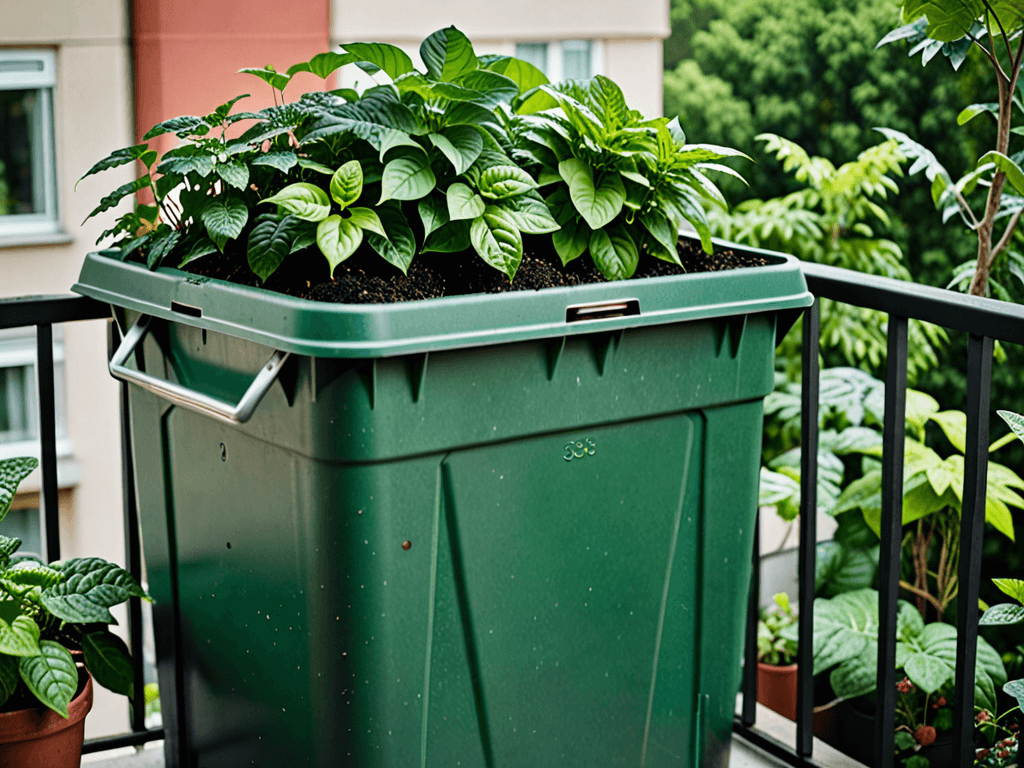Urban composting basics are essential for anyone looking to live more sustainably in a city environment.
Starting your own composting routine is not only environmentally friendly but also a great way to reduce waste and enrich soil.
This article will guide you through everything you need to know, from understanding the benefits to overcoming challenges along the way.
Understanding Urban Composting
Urban composting is the process of turning organic waste into nutrient-rich compost within city environments. It involves decomposing food scraps, yard waste, and other organic materials, which helps reduce landfill waste and promotes sustainable living practices.
This eco-friendly practice can be carried out in small spaces, making it perfect for urban dwellers. Composting not only diverts waste from landfills but also creates a valuable product that can be used to enhance gardens and potted plants, improving soil health and plant growth.
By incorporating urban composting into your daily routine, you’re contributing to a significant environmental impact and fostering a greener city landscape.
Benefits of Composting in City Environments
Composting in city environments offers numerous benefits that extend beyond reducing waste. One of the most significant advantages is the decrease in landfill use, as food scraps and organic matter are diverted to create compost. This not only reduces methane emissions, which contribute to climate change, but also supports sustainability efforts within urban areas.
Additionally, composting enriches soil, leading to healthier plants and gardens. It can act as a natural fertilizer, reducing the need for chemical options and promoting a more eco-friendly lifestyle.
Furthermore, involving communities in these practices can enhance public awareness about environmental issues, fostering stronger, more environmentally-conscious urban communities.
Essential Supplies for Urban Composting
Starting urban composting requires some essential supplies to ensure success and efficiency. First, you need a compost bin or tumbler that suits your space; whether it’s a small balcony or a corner in your kitchen, choose a bin that fits comfortably.
A mix of brown and green materials is crucial for the composting process. Browns like dried leaves or shredded paper provide carbon, while greens such as vegetable scraps offer nitrogen.
To manage odor and pest control, a composting starter or accelerator can be useful to speed up the decomposition. Additionally, having a pair of gardening gloves and a small trowel on hand will help you turn and maintain the compost, ensuring proper aeration and moisture levels.
With these supplies, you can easily begin your urban composting journey.
Step-by-Step Guide to Starting Your Compost
Beginning your composting journey is straightforward with these simple steps. First, select a suitable location for your compost bin, ideally in a spot with good air circulation. Add a layer of brown materials, such as twigs or shredded paper, to help with drainage.
Next, add green waste like vegetable peels and coffee grounds, ensuring an even mix of greens and browns.
Every time you add new waste, stir the compost using a garden fork to enhance aeration.
Keep the pile as moist as a damp sponge. If it becomes too wet or dry, adjust by adding more browns or watering lightly.
As decomposition progresses, monitor for any unpleasant odors and address by turning and balancing the mix accordingly.
By following these steps, you’ll produce rich compost, perfect for your urban garden.
Common Challenges and Solutions
Composting in urban areas can present certain challenges, but each has practical solutions to ensure success.
One common issue is the presence of unpleasant odors, often caused by an imbalance in the compost material.
This can be addressed by ensuring a proper ratio of brown (carbon-rich) to green (nitrogen-rich) materials and turning the pile regularly.
Another challenge is managing pests, like flies or rodents, which can be mitigated by using a bin with a secure lid and avoiding adding meat or dairy products.
Limited space can also be an issue in cities; using vertical or balcony composting methods can help utilize small spaces effectively.
High moisture levels may lead to soggy compost, so regularly checking moisture and adding dry materials as needed is essential.
By understanding these challenges and their solutions, urban composting can become a smooth and rewarding endeavor.
How to Maintain Your Compost Effectively
Maintaining your compost effectively ensures it decomposes properly and results in rich compost. Start by keeping a good balance of greens and browns. This means regularly adding food scraps and yard waste, while monitoring the carbon to nitrogen ratio.
Turn the compost pile at least once a week to introduce air, which aids in faster decomposition. Checking moisture levels is crucial; the compost should feel like a damp sponge, not too wet or dry.
If it’s too dry, sprinkling with water can help, and if too wet, adding shredded paper or dry leaves can restore balance. During colder months, consider insulating the compost with straw or tarp to maintain heat.
These practices will keep your compost active and thriving.
Integrating Composting with Urban Gardening
Integrating composting with urban gardening creates a sustainable cycle where waste becomes a resource.
The compost produced from kitchen scraps and yard waste can be used to enrich the soil in urban gardens, providing essential nutrients for plants.
This practice encourages healthier plant growth and can result in more abundant yields of fruits, herbs, and vegetables.
It’s important to incorporate the compost into the soil by mixing it well to improve soil structure and moisture retention.
Urban gardeners benefit from this natural fertilizer, reducing reliance on chemical fertilizers and promoting a healthy ecosystem.
This integration supports biodiversity by attracting beneficial insects and making the urban garden thrive.
Environmental Impact of Urban Composting
Urban composting significantly impacts the environment by reducing waste that ends up in landfills.
Organic waste in landfills releases methane, a potent greenhouse gas that contributes to climate change.
By composting, these emissions are reduced, helping combat climate change.
Composting also returns nutrients to the soil, supporting plant growth and enhancing biodiversity in urban areas.
It reduces the need for chemical fertilizers, which can harm local ecosystems.
Moreover, urban composting can educate and engage communities in sustainable practices, encouraging more environmentally-friendly lifestyles.
Urban composting offers a practical and impactful way to address waste management challenges and promote sustainability.
By reducing landfill waste and cutting down methane emissions, composting plays a crucial role in mitigating the effects of climate change.
It enhances soil quality, supports urban greenery, and fosters community engagement in eco-friendly practices.
Given its environmental and societal benefits, integrating urban composting into daily life is not just an environmental duty but a step towards a healthier urban ecosystem.
Embrace composting as a vital part of urban living.
FAQ – Frequently Asked Questions about Urban Composting
What is urban composting?
Urban composting is the practice of turning organic waste into compost in city environments to reduce landfill waste and enrich soil.
How do I start composting in a small apartment?
You can use a compact compost bin and start with kitchen scraps like vegetable peels and coffee grounds, ensuring a balance of greens and browns.
What are the benefits of composting in a city?
Composting reduces waste in landfills, decreases methane emissions, and creates valuable compost for urban gardens and green spaces.
How can I prevent odor in my compost bin?
Make sure to balance green and brown materials, keep the pile aerated by turning it regularly, and avoid adding meat or dairy products.
What should I do if pests become a problem?
Ensure your compost bin has a secure lid, avoid adding meat products, and maintain a balanced mix of compost materials.
Can I compost in winter?
Yes, you can continue composting in winter by insulating your bin with straw or a tarp to keep the composting process active.


